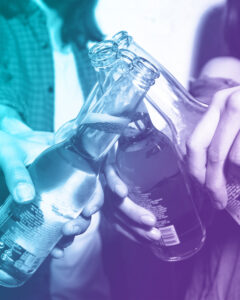Does Alcohol Raise Cholesterol
You have always been active, played sports, and found ways to stay moving. Even after you graduated high school, you still sought out physical outlets like basketball. But it wasn’t always about hanging out with friends or having fun. Deep down, it kept you sane from the secrets you were keeping.

The depression would seem to come in waves, washing over you as if you were standing in the Gulf, right off Davis Islands Beach. You couldn’t always predict when they would come, but you knew that when they did, sports would be replaced by your other vice – alcohol. Days sometimes blurred into weeks as you would go through drinking bouts, trying everything to get your brain to just be normal.
This self-medicating with activity during the highs and alcohol during the lows became your routine for years. Before you know it, you are already pushing 45. At your regular doctor’s visit, they inform you that despite a healthy body, your cholesterol is high. This is probably from the alcohol, but you can’t let your doctor know about that.
In 2022, 6 out of every 100,000 Hillsborough County residents died of alcoholic liver disease. Many are familiar with the effects of alcohol on the liver, but what about the rest of the body? Clean Recovery Centers’ blog serves as a free resource for our Suncoast communities to gain insight into how substances affect every aspect of life. With certified, rapid-resolution therapists at each of our locations, our team is able to dive deep into the root causes of addiction for our clients. The medical professionals at Clean can help you navigate how alcohol has affected your body. So, does alcohol raise cholesterol? Let’s investigate this further.
Can Drinking Alcohol Affect Your Cholesterol Levels?
Alcohol affects many aspects of the body, including cholesterol. When it comes to nutritional health, many are concerned with what they are putting in. Food and beverages have nutritional information about how much fiber, protein, carbohydrates, and cholesterol they contain. With alcohol, the common misconception is that almost all forms do not affect cholesterol because the nutritional information states that the alcohol does not contain any. While this is true, alcohol can still have an effect on cholesterol levels.
What Is Cholesterol?
Cholesterol is naturally present within the body and is a waxy and fat-like substance. It primarily comes from the liver and different foods. Cholesterol also helps with vitamin D and hormone production. There are two types of cholesterol: high density lipoprotein (HDL) and low density lipoprotein (LDL). When testing cholesterol levels, blood tests will measure the HDL and LDL levels as well as total cholesterol in the body.
What Role Does Cholesterol Play in Health?
HDL is called the “good” type of cholesterol. This is because it carries cholesterol through the blood to the liver for removal. LDL is considered “bad” cholesterol as it can build up in the arteries, causing narrowing that can lead to blockages. When LDL is high, it increases how much cholesterol is building up, putting the person at risk for heart attacks or heart disease. Though HDL is good cholesterol, when levels are high it also increases cholesterol buildup. This is because when too much HDL is present, it cannot function properly. Having cholesterol levels within normal range lowers the risk of a cardiac event.
Cholesterol and Alcohol
There have been many old wives’ tales surrounding alcohol, cholesterol, and heart health. The rumors going around to this day include “red wine is heart-healthy,” “alcohol prevents strokes,” and “alcohol lowers the risk of heart disease.” The question is, do any of these hold true? Is there a benefit to alcohol consumption? Let’s explore further.
Does Alcohol Boost “Good” Cholesterol?
Many studies have been conducted showing the benefit of light to moderate drinking and HDL cholesterol. Specifically, it was found a glass of red wine per day would increase the good cholesterol within the body. However, there are factors that are up in the air as to why this would be. Red wine contains many of the same antioxidants as grapes or grape juice, because red wine is made with the skin of the grape. It was also noted that red wine drinkers tend to be in better health physically by eating a balanced diet and exercising. While some people may see benefits from red wine consumption, the American Heart Association warns that there is no solid cause-and-effect proof that light drinking is beneficial to good cholesterol or heart health.
How Alcohol Can Affect “Bad” Cholesterol
Heavy alcohol consumption is linked to raising LDL cholesterol within the body. One study showed that those who regularly participate in binge drinking are likely to have higher bad cholesterol levels. In the study, even those who were in the non-binge level category saw increases in LDL cholesterol. There are factors that can affect the rate of increase of LDL cholesterol, such as weight, age, sex, and lifestyle.
Heavy Alcohol Intake Increases Heart Disease Risk Factors
 Heavy alcohol consumption does increase the risk of developing heart disease for different reasons. As we have discussed, alcohol raises bad cholesterol, resulting in clogged arteries. This leads to reduced blood flow and can result in heart attacks or strokes. Alcohol also raises blood pressure, causing the heart to work harder to pump blood throughout the body. Over time, this results in cardiomyopathy – weakening of the heart muscle. With this comes irregular heartbeat and the risk of heart disease and heart failure.
Heavy alcohol consumption does increase the risk of developing heart disease for different reasons. As we have discussed, alcohol raises bad cholesterol, resulting in clogged arteries. This leads to reduced blood flow and can result in heart attacks or strokes. Alcohol also raises blood pressure, causing the heart to work harder to pump blood throughout the body. Over time, this results in cardiomyopathy – weakening of the heart muscle. With this comes irregular heartbeat and the risk of heart disease and heart failure.
Alcohol consumption – even at light levels – can increase the risk of certain cancers. Liver, esophageal, stomach, and mouth cancer can occur. While these may not directly affect the heart, anytime the body is fighting a health condition, there is extra strain. When the heart is already weakened, trying to fight off cancer can be especially difficult. This can lead to heart disease and heart failure.
Is It Possible to Drink Alcohol and Maintain Healthy Cholesterol Levels?
Those who partake in light alcohol consumption may see their cholesterol levels stay within a healthy range. According to the Centers for Disease Control (CDC), light drinking is defined as 12 drinks per year and fewer than 3 drinks per week on average. However, it is key to maintain other areas of health as well such as exercising regularly and eating a balanced diet. Those who drink moderately may see fluctuations in their cholesterol levels, and alcohol consumption may need to be adjusted. Moderate drinking is defined as 3 or more drinks but less than 7 per week for women and 3 or more drinks but less than 14 per week for men.
The rule of thumb is that alcohol affects more than just cholesterol when consumed. Despite possibly helping HDL cholesterol, even light drinking poses a risk of cancer development. Those who have underlying conditions whether they involve the heart or not should take precautions when it comes to alcohol use. The bottom line: alcohol is not a heart-healthy cure-all, and drinking should always be done in moderation, if at all.
Improve Heart Health by Seeking Treatment for Alcoholism in Tampa, FL
Prolonged alcohol use has detrimental effects on the body, but there is hope for a brighter and healthier tomorrow. Finding an alcoholism treatment program that addresses both the physical and mental aspects of addiction is the first step toward a successful recovery. Damage done to the heart and liver can be reversed when drinking is stopped. Working with a therapist will help you develop healthy coping strategies and develop a routine that will allow you to thrive and focus on your health and well-being.
If you or someone you love is beginning to see the repercussions of alcoholism such as high cholesterol, don’t wait until it’s too late. Clean Recovery Centers utilizes a unique, three-phase approach to treatment addressing all aspects of addiction: physical, mental, spiritual, and social. With locations across the Suncoast featuring housing certified by the Florida Association of Recovery Residences (FARR), you will never have to worry about where you will be staying or where your next meal will come from. Call us today at (888) 330-2532 to learn more about our alcohol use disorder program.
Sources:
- https://www.flhealthcharts.gov/ChartsDashboards/rdPage.aspx?rdReport=Death.Dataviewer&cid=0390
- https://www.ncbi.nlm.nih.gov/pmc/articles/PMC6575145/
- https://www.cdc.gov/nchs/nhis/alcohol/alcohol_glossary.htm#:~:text=Current%20light%20drinker%20%E2%80%93%20At%20least,average%20over%20the%20past%20year.


